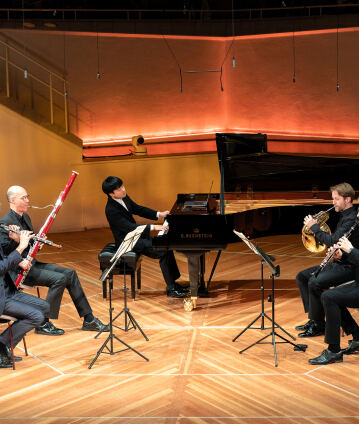Philharmonic chamber music: Piano quintets by Mozart and Beethoven

In 1784, Mozart described his Piano Quintet as “the best thing I have written in my life”. Although many of his most famous works were still to be written, the quintet is a real jewel. It is no surprise that it inspired the young Beethoven to write a no less marvellous quintet. Members of the Berliner Philharmoniker and pianist Kit Armstrong also present works by Hans Werner Henze and Wolfgang Rihm.
After moving from Salzburg, the mid-1780s saw Mozart enjoy great success in Vienna with his piano concertos. Their influence on the Quintet K. 452 can be seen in the virtuosic pianistic passages of the outer movements and sections in which the wind parts take a back seat. However, the oboe, clarinet, horn and bassoon – Mozart also composed solo concertos for all of these instruments – are allowed to emerge with their own individual character in the marvellous melodies, particularly in the larghetto. Mozart replaced the flute in traditional wind quintets with the piano; an instrumentation unknown when the work was written.
In his quintet, Beethoven clearly drew on Mozart’s model not only through the identical instrumentation, but also through the key of E flat major – which is favourable for wind instruments –, the three-movement structure, and the popular character of the final theme. Beethoven also quotes an aria from Mozart’s opera Don Giovanni in the main theme of the slow movement. However, Beethoven also brought his more robust pianism and his typical, sometimes grim humour to this homage.
The modern pieces in the programme feature the wind quintet line-up with flute. Hans Werner Henze explained that in L’autunno (Autumn) he was drawing on “the old traditions of contrapuntal music”. The fifth and final movement of the quintet, which was completed in 1979, is based on an aria by Johann Sebastian Bach. Henze was inspired by the expressionist poet Georg Trakl, who wrote: “The wine is pressed, the gentle silence / Filled with quiet answers to dark questions”. Wolfgang Rihm wrote his wind quintet in 2003 as a commission from the Lucerne Festival. The work, whose fragmentary scherzo movement is entitled Fetzen (Scraps), impresses with its richness of music-historical relationships, tonal imagination and abundance of figures.
© 2025 Berlin Phil Media GmbH